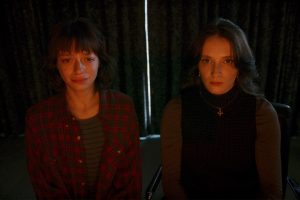
Chromatically, Pascal Plante’s colorfully titled thriller Red Rooms (opening Friday in Lake Worth Beach) lives in a world of black and white. The movie is set largely in two locations. One is an antiseptic, glaringly bright courtroom in Montreal, where a man named Ludovic Chevalier is standing trial for murdering, maiming and sexually violating (the heinous order of events is correct) three teenage girls — and for live-streaming the actions on the dark web for a paying audience.
The other setting is a shadowy “smart” apartment in a towering high-rise nearby, a place we almost always observe at night, where Kelly-Anne (Juliette Gariépy), a fashion model, spends her downtime under the addictive glow of an array of AI-driven computers. Morally, Plante’s film is nothing like its dichotomous, high-contrast visual palette. It exists in an increasingly gray zone that blurs distinctions between psychopath and investigator, hacker and hero. Even after some of its central questions are resolved, it leaves dark mysteries in its wake.
Kelly-Anne is the seemingly unlikely thread connecting the movie’s two worlds. A high-fashion model who maintains a strict diet and a rigorous fitness routine, she’s hardly the mental picture of a serial-killer obsessive, the sort of basement dweller eternally beavering away on their devices to connect dots the police might have missed, or to reexamine forensics for an alternative explanation. That role is more comfortably filled by Clémentine (Laurie Babin), a jittery, wild-eyed “groupie” Kelly-Anne meets on the first day of Chevalier’s trial, after both had slept on the street outside the courthouse for a coveted seat in the gallery.
Clémentine is a true believer in Chevalier’s innocence, the sort of cultish devotee who can alternative-fact her way around every piece of evidence. Kelly-Anne presents as a more sober-minded aggregator of information — hardly a groupie, just a curious citizen. But as Kelly-Anne’s immersion in the trial, into the killer’s online world, and even into the families of the victims begins to become all-consuming — to the point of losing her job — the question of which trial attendee is the more mentally unhinged person upends our expectations.
Writer-director Plante’s third and most widely distributed film is a deep and disturbing dive into the world of TOR browsers, of criminal liaisons in ones and zeros, of snuff films in the internet age. It’s a space that has grown faster and more depraved since Olivier Assayas dipped his toes into it with 2002’s Demonlover; don’t be surprised if you’re torn between compulsively watching Red Rooms (the title, we learn, is dark-web code for the locations of live-streamed murders, in this case the killer’s garage) and wanting to leave the theater and shake off the sickness.
Cinematographer Vincent Biron shot the film with clinical precision and unshowy virtuosity. Seldom if ever is a scene edited for coverage. Plante cuts to make a point, and respects the integrity of the unbroken take, most masterfully exhibited during the 10-minute opening statements of Chevalier’s trial, the camera touring the courtroom in airless detachment.
Just as we never peer into the killer’s head (the actor who plays Chevalier, Maxwell McCabe-Lokos, never speaks), Kelly-Anne, too, is a nebulous object of Plante’s diamond-hard gaze. True, Plante concedes in leaving us a few bread crumbs as to Kelly-Anne’s twisted psychology. She makes money on the side as a mercenary player of online poker, at one point bragging to Clémentine that her skill lies in exploiting the emotionally driven moves of her weaker combatants. “That’s what I love the most — seeing them lose everything,” she adds. But as to Kelly-Anne’s motives in pursuing the Chevalier case to self-destructive, certifiably creepy, even Vertigo-esque extremes? Plante keeps his cards close to his vest.
While this may be frustratingly inconclusive to some viewers, to borrow from another Hitchcock joint, think about how much better Psycho would have been without the tacked-on psychological profile in its coda. We didn’t need the human condition spelled out for us then, and we don’t now. Serial killers have inspired cults of personality for as long as they’ve been a cottage industry. Red Rooms captures our morbid fascination with true crime in the technologically oversaturated, conspiratorially minded, informationally curated 21st century.
“Money is just numbers on a screen,” Kelly-Anne says, dismissively, to her penniless charity project, Clémentine. Similarly, the truth, Plante suggests in the haunting final shot of Red Rooms, may be little more than pixels subject to digital decay.
RED ROOMS. Director: Pascal Plante; Cast: Juliette Gariépy, Laurie Babin, Elisabeth Locas, Maxwell McCabe-Lokos; Distributor: Utopia; Not rated; In French;
Runs Friday to Sunday (Sept. 6-8) at Lake Worth Playhouse’s Stonzek Theater